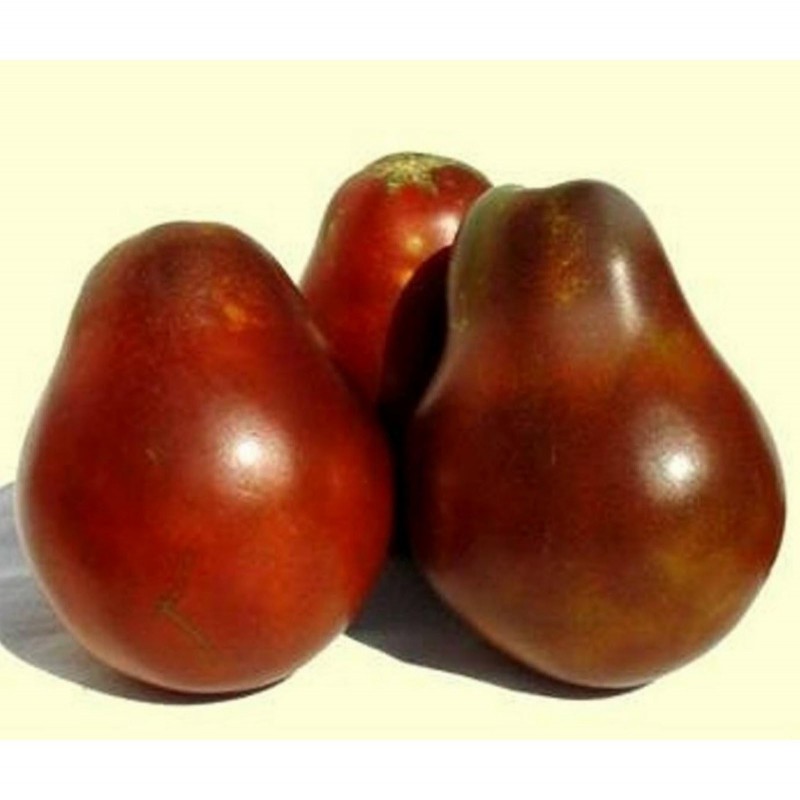
Ποικιλία από τη Ρωσία






Σπόροι Ντομάτα μαύρη τρούφα
Τιμή για το πακέτο των 10 , 50 σπόρους.
One of the finest Heirloom Black tomato varieties we have grown, with a tear drop shape, stunning deep dark-red colour, meaty texture and fantastic complex sweet and zesty flavour. Fruits average 2 ½” diameter and the plants are extremely productive with 5-6 fruits per truss
Resveratrol is the subject of several human clinical trials, among which the most advanced is a one year dietary regimen in a Phase III study of elderly patients with Alzheimer's disease.
Anthocyanins and other phenolics
Anthocyanins tend to be the main polyphenolics in purple grapes whereas flavan-3-ols (i.e. catechins) are the more abundant phenolic in white varieties.[31] Total phenolic content, a laboratory index of antioxidant strength, is higher in purple varieties due almost entirely to anthocyanin density in purple grape skin compared to absence of anthocyanins in white grape skin.[31] It is these anthocyanins that are attracting the efforts of scientists to define their properties for human health.[32] Phenolic content of grape skin varies with cultivar, soil composition, climate, geographic origin, and cultivation practices or exposure to diseases, such as fungal infections.
Red wine may offer health benefits more so than white because potentially beneficial compounds are present in grape skin, and only red wine is fermented with skins. The amount of fermentation time a wine spends in contact with grape skins is an important determinant of its resveratrol content.[33] Ordinary non-muscadine red wine contains between 0.2 and 5.8 mg/L,[34] depending on the grape variety, because it is fermented with the skins, allowing the wine to absorb the resveratrol. By contrast, a white wine contains lower phenolic contents because it is fermented after removal of skins.
Wines produced from muscadine grapes may contain more than 40 mg/L, an exceptional phenolic content. In muscadine skins, ellagic acid, myricetin, quercetin, kaempferol, and trans-resveratrol are major phenolics. Contrary to previous results, ellagic acid and not resveratrol is the major phenolic in muscadine grapes.
The flavonols syringetin, syringetin 3-O-galactoside, laricitrin and laricitrin 3-O-galactoside are also found in purple grape but absent in white grape.
Seed constituents
Main articles: Grape seed extract and Grape seed oil
Biochemical and preliminary clinical studies have demonstrated potential biological properties of grape seed oligomeric procyanidins. For example, laboratory tests indicated a potential anticancer effect from grape seed extract. According to the American Cancer Society, "there is very little reliable scientific evidence available at this time that drinking red wine, eating grapes, or following the grape diet can prevent or treat cancer in people".
Grape seed oil from crushed seeds is used in cosmeceuticals and skincare products for perceived health benefits. Grape seed oil contains tocopherols (vitamin E) and high contents of phytosterols and polyunsaturated fatty acids such as linoleic acid, oleic acid and alpha-linolenic acid.
Concord grape juice
Commercial juice products from Concord grapes have been applied in medical research studies, showing potential benefits against the onset stage of cancer, platelet aggregation and other risk factors of atherosclerosis, loss of physical performance and mental acuity during aging and hypertension in humans.
Χαρακτηριστικά
 Reviews (0)
Reviews (0)